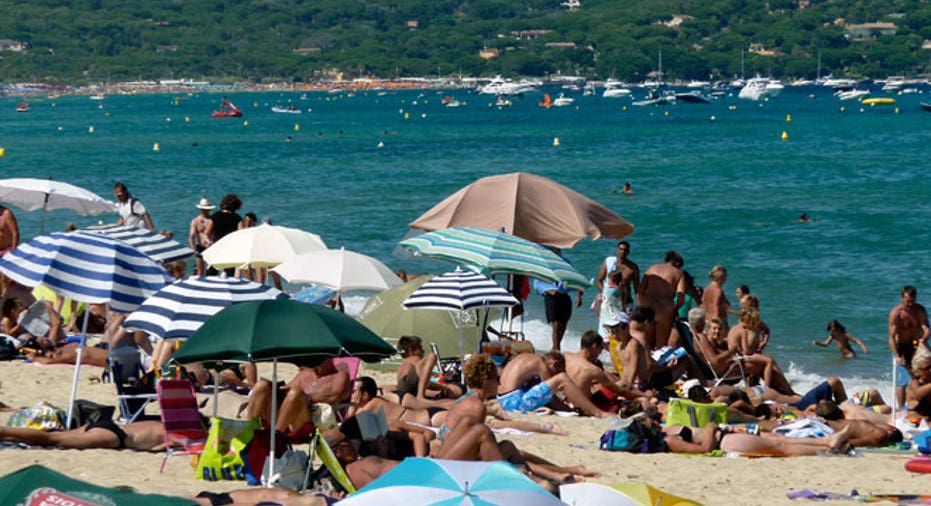Paradise Found: Set Sail for Frugal Island Fun

For people craving a relaxing getaway, there's really no option more alluring than an island vacation. While each island is a different experience, nearly all islands have one thing in common: cost.
If you don't plan carefully, an island vacation can be a budget breaker, according to Marsha Wienert, regional spokeswoman for Starwood Hotels Hawaii.
"There certainly is an island premium, whether you're staying at the very top end of the price scale or looking for more value," Wienert says. "But the important thing to remember is that while islands can be more expensive in general, many destinations like Hawaii offer vacations at all price points. So the key to having an island vacation without breaking the bank is always going to be planning."
Several factors drive up the cost of an island vacation.
Airline tickets may not be as competitive as they are for mainland destinations because some islands don't have as many carriers serving them. If the island requires multiple flights to reach, you can spend even more.
Island hotels can more expensive than their mainland counterparts because the available inventory is often more limited. Finally, most goods you purchase on an island will cost more because the extra cost of transportation is built into the price tourists and locals pay, Wienert says.
Still, there are strategies travelers can use to make sure that their dream island vacation doesn't turn into a financial nightmare.
Right Island, Right Time
While many islands boast great year-round beach weather, every island has high and low seasons, and the price variations can be substantial, Wienert says.
In Hawaii, the busy months are in the winter and summer. "If you travel in the spring or fall, you'll save money, and the experience is just as good," Wienert says.
Likewise, Caribbean islands have high and low seasons, but the trade-offs can be intense heat and the chance of hurricanes in the summer months, says Mathias Friess, CEO of Webjet.com, a Tampa, Fla.-based travel site. But if you like the heat or you're willing to risk the possibility of a hurricane, off-season travel can be a big cost saver on any island, he says.
But the greatest predictor of costs is the island.
"Islands that have an abundance of resorts and numerous airlines servicing their market are more sensitive to demand and therefore very likely to have big discounts available at certain periods throughout the year," Friess says. "The Bahamas, Puerto Rico, and Jamaica are always likely to present travelers with good deals, as each island is served by at least three carriers departing from Florida as well as numerous carriers flying directly from major cities further up the East Coast."
On the other hand, small, hard-to-reach islands can have their financial benefits, too.
"Island lovers often believe that the harder and more expensive an island is to reach, the less spoiled it is when you get there," says Heather Evans, a self-described island lover who runs a real estate and hotel business on Bequia, a small island in the Caribbean. "Remote islands are often less expensive to stay on, which balances out the total cost of your vacation," she says.
But while Evans says Bequia hotels are significantly less expensive than properties on more popular islands, there's a trade-off in terms of pampering.
"It's not exactly an apples-to-apples (comparison) because Bequia hotels are simple and offer fewer amenities than hotels elsewhere," Evans says. "People who like it here prefer the simplicity, but it's not for everyone."
The Total Package
With flight and hotel costs being the two greatest price drivers, it's always smart to look into packages that offer airfare, accommodation and sometimes even a car rental, Wienert says.
"That's where you're most likely to see the biggest discounts," Wienert says. "But you have to do your research to know if the deal is really a good one."
Packages also can include food if you book a room at an all-inclusive resort. Adrienne Sasson, regional marketing director at Redefine Vacations, a travel agency in King of Prussia, Pa., says it may seem like a luxury option, but it's an idea that budget-conscious island lovers shouldn't overlook.
"The easiest way to budget is to consider an all-inclusive resort," Sasson says. "You know in advance the total cost of the vacation since all of the food and beverages and many resort activities and amenities are covered."
Saving on the Island
What you spend on food, activities and incidentals also can drive up the cost of an island vacation. To keep food costs low -- assuming you didn't buy an all-inclusive package, Wienert offers two suggestions. First, find other options for breakfast because that will save you from an expensive hotel breakfast. Second, Wienert suggests asking locals to recommend their favorite food options.
"If you're more adventurous, you can get a real taste of what people on the island like to eat," says Wienert, adding that food may be less expensive than at restaurants catering primarily to tourists.
Activities also can raise costs. But here, too, a little research can help.
"On a lot of islands, there are plenty of free activities, especially if they involve nature," Wienert says. "But you need to do your homework and find out whether you'll need a car to get to them because public transportation isn't available on all islands."
For activities that charge a fee, it pays to look for island vacation discounts. "Investigate, and pick up tourism publications because you'll find coupons," Wienert says.
As for incidentals, Wienert says tourists who pack what they need rather than buying things like sunscreen on the island will save money.
"(But) don't forget to set a budget for souvenirs, because when you visit an island, you'll always want to take something home," she says.



















